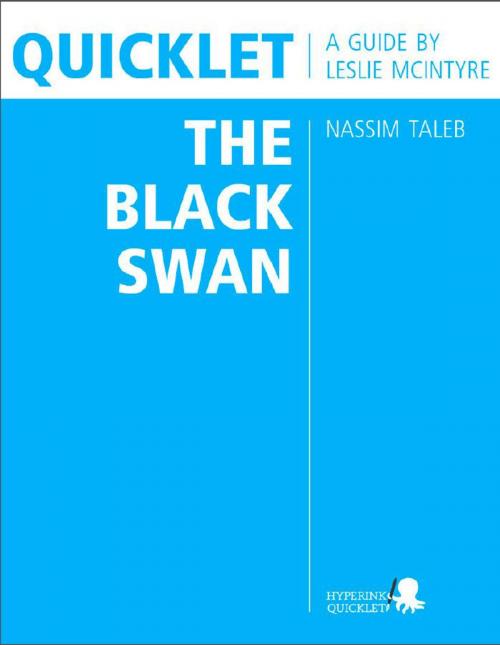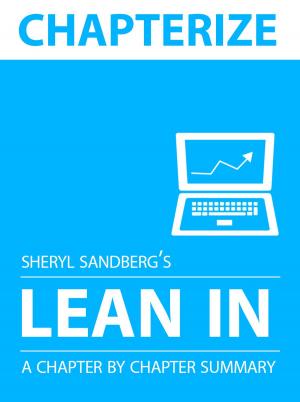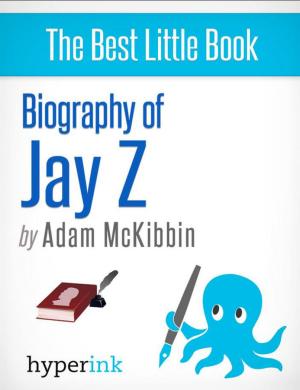Quicklet on Nassim Taleb's The Black Swan (CliffNotes-like Book Summary and Analysis)
Nonfiction, Reference & Language, Study Aids, Book Notes, Art & Architecture, General Art| Author: | Leslie McIntyre | ISBN: | 9781614646846 |
| Publisher: | Hyperink | Publication: | July 30, 2012 |
| Imprint: | Hyperink | Language: | English |
| Author: | Leslie McIntyre |
| ISBN: | 9781614646846 |
| Publisher: | Hyperink |
| Publication: | July 30, 2012 |
| Imprint: | Hyperink |
| Language: | English |
ABOUT THE BOOK
The first edition of Nassim Nicholas Taleb’s second mainstream work, The Black Swan: The Impact of the Highly Improbable, was published by Random House in April of 2007. In this book Taleb says many, many things; he warns against the dangers of ignoring outliers and trusting experts; he gives advice on how to position oneself to take advantage of the unexpected; he creates a fictional narrative about an author’s rise to literary stardom; and he draws upon the work of some of his favorite (as well as his most despised) thinkers in the fields of philosophy, mathematics, and psychology.
But the thing about The Black Swan that is most likely to grab the contemporary reader’s attention is its apparent prediction of the financial collapse that occurred only a few months after its publication. Though Taleb argues against the validity of economic forecasts, he makes some eerily specific critiques of the banking industry, “just months before the subprime fiasco rocked global markets and led banks to announce at least $208 billion worth of writedowns,” according to Bloomberg News. Any criticisms of The Black Swan seem to fade given the uncanny timing of its release.
In the wake of the financial crisis, while other economists cringed at their lack of foresight, Taleb was hailed as a prophet.
EXCERPT FROM THE BOOK
While we might prefer to believe that the world operates in a linear fashion, Taleb assures us this is not so. Says Taleb, “[N]onlinear relationships are ubiquitous in life. Linear relationships are truly the exception; we focus on them in classrooms and textbooks because they are easier to understand (89).”
Chapter Eight Giacomo Casanova’s Unfailing Luck
In Chapter Eight, Taleb introduces the concept of silent evidence. Like the antilibrary, silent evidence emphasizes what is not known over what is. Essentially, silent evidence are those instances which do not produce a Black Swan and thus do not receive acknowledgement. As an example, Taleb points to the many, many talented writers who never get their big break and whose work, therefore, is never inducted into the literary canon. Since such works are generally inaccessible, we tend to discount their relevance and focus solely on the Black Swan works that did, through some combination of talent and good fortune, secure their place in literature. In essence we tend to give disproportionate weight to the stories of those who succeed in some manner or another -- by making a medical breakthrough, by becoming a millionaire, or, in some cases, by simply surviving. The tendency to ignore silent evidence (the failures), Taleb says, results in a distortion bias, “the difference between what you see and what is there...
Buy the book to continue reading!
Follow @hyperink on Twitter!
Visit us at www.facebook.com/hyperink!
Go to www.hyperink.com to join our newsletter and get awesome freebies!
CHAPTER OUTLINE
Nassim Taleb's The Black Swan
+ Introduction to The Black Swan
+ Introducing Nassim Nicholas Taleb
+ The Black Swan: An Introductory Overview
+ Chapter Summaries
+ ...and much more
ABOUT THE BOOK
The first edition of Nassim Nicholas Taleb’s second mainstream work, The Black Swan: The Impact of the Highly Improbable, was published by Random House in April of 2007. In this book Taleb says many, many things; he warns against the dangers of ignoring outliers and trusting experts; he gives advice on how to position oneself to take advantage of the unexpected; he creates a fictional narrative about an author’s rise to literary stardom; and he draws upon the work of some of his favorite (as well as his most despised) thinkers in the fields of philosophy, mathematics, and psychology.
But the thing about The Black Swan that is most likely to grab the contemporary reader’s attention is its apparent prediction of the financial collapse that occurred only a few months after its publication. Though Taleb argues against the validity of economic forecasts, he makes some eerily specific critiques of the banking industry, “just months before the subprime fiasco rocked global markets and led banks to announce at least $208 billion worth of writedowns,” according to Bloomberg News. Any criticisms of The Black Swan seem to fade given the uncanny timing of its release.
In the wake of the financial crisis, while other economists cringed at their lack of foresight, Taleb was hailed as a prophet.
EXCERPT FROM THE BOOK
While we might prefer to believe that the world operates in a linear fashion, Taleb assures us this is not so. Says Taleb, “[N]onlinear relationships are ubiquitous in life. Linear relationships are truly the exception; we focus on them in classrooms and textbooks because they are easier to understand (89).”
Chapter Eight Giacomo Casanova’s Unfailing Luck
In Chapter Eight, Taleb introduces the concept of silent evidence. Like the antilibrary, silent evidence emphasizes what is not known over what is. Essentially, silent evidence are those instances which do not produce a Black Swan and thus do not receive acknowledgement. As an example, Taleb points to the many, many talented writers who never get their big break and whose work, therefore, is never inducted into the literary canon. Since such works are generally inaccessible, we tend to discount their relevance and focus solely on the Black Swan works that did, through some combination of talent and good fortune, secure their place in literature. In essence we tend to give disproportionate weight to the stories of those who succeed in some manner or another -- by making a medical breakthrough, by becoming a millionaire, or, in some cases, by simply surviving. The tendency to ignore silent evidence (the failures), Taleb says, results in a distortion bias, “the difference between what you see and what is there...
Buy the book to continue reading!
Follow @hyperink on Twitter!
Visit us at www.facebook.com/hyperink!
Go to www.hyperink.com to join our newsletter and get awesome freebies!
CHAPTER OUTLINE
Nassim Taleb's The Black Swan
+ Introduction to The Black Swan
+ Introducing Nassim Nicholas Taleb
+ The Black Swan: An Introductory Overview
+ Chapter Summaries
+ ...and much more















